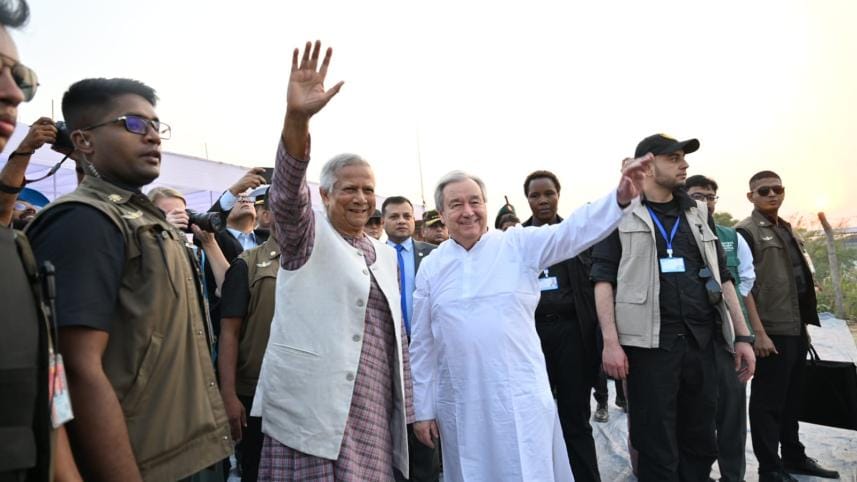Rohingya repatriation: Aid to Rakhine via Bangladesh can help

UN Secretary-General Antonio Guterres and Bangladesh authorities yesterday discussed whether it would be possible to deliver humanitarian aid inside Myanmar through Bangladesh, so that the Rohingyas could return to their homeland.
Dignified repatriation of Rohingyas would be extremely difficult at the moment, given the ongoing conflicts between the Myanmar military and Arakan Army in Rakhine, he said.
That's why it is essential to mobilise the international community, especially the countries neighbouring Myanmar, to put pressure on it to find a solution, he said.
Ending the violence and creating the mechanisms of dialogue leading to a true democratic solution in Myanmar would naturally facilitate the return of the Rohingya refugees, he said.
At the same time, it is important to intensify humanitarian aid inside Myanmar to create the conditions for the return to be successful.
"And that is the reason why one of the discussions we had was about the possibility, if the circumstances allow, to have also humanitarian aid channelled from Bangladesh. But that is, obviously, a matter that would require the authorisation and the cooperation of the parties to the conflict," Guterres said.
Guterres arrived in Bangladesh on March 13 on a four-day visit.
Bangladesh has been facing the enormous challenge of providing humanitarian assistance to more than a million Rohingyas sheltered in Cox's Bazar. Most of them fled violence in Myanmar in 2017.
Not a single Rohingya volunteered to return to Rakhine since then. Amid recent escalation of conflicts between the Myanmar military and Arakan Army, nearly one lakh more Rohingyas arrived in Bangladesh.
The crisis has deepened with the WFP reducing monthly food aid from $12.5 to $6 starting next month as the USAID has drastically reduced the funding globally under the Trump administration.
Just on Saturday, WFP warned that more than one million people in Myanmar will be cut off from WFP's lifesaving food assistance starting in April due to critical funding shortfalls.
The cuts will also impact almost 100,000 internally displaced people, including Rohingyas, in central Rakhine who will have no access to food without WFP assistance, reports AFP.
According to diplomatic sources, the UN has been seeking to send humanitarian aid to Rakhine through Bangladesh amid a fear of famine-like situation there as was reported by the UNDP in November last year.
The report titled "Rakhine: A Famine in the Making" said Rakhine is on the verge of an unprecedented disaster due to a combination of interlinked issues.
"Restrictions on goods entering Rakhine, both internationally and domestically, have led to a severe lack of income, hyperinflation, and significantly reduced domestic food production. Essential services and a social safety net are almost non-existent, leaving an already vulnerable population at risk of collapse in the coming months," it read.
The report said Rakhine's economy has almost stopped functioning. Critical sectors such as trade, agriculture, and construction are at a standstill. Export-oriented, agro-based livelihoods are disappearing as markets become inaccessible due to blockades.
Predictions indicate that by March-April 2025, domestic food production will only cover 20 percent of the needs. Combined with the near-total halt of trade, over 2 million people are at risk of starvation.
Against this backdrop, the UN, at the request of Bangladesh, is going to hold a high level meeting on the Rohingya issue later this year, considering that the Rohingya had become a forgotten crisis.
Asked about the possibility of a humanitarian corridor through Bangladesh, Foreign Adviser Touhid Hossain said, "This is more of an operational matter which we will of course deal with the local [UN] offices."
About the role of the Arakan Army in Rohingya repatriation, Guterres said, "We know that in the past, the relations between the Rakhine and the Rohingya communities were not easy, and so, I think it's important to engage the Arakan Army in order for the full respect of the rights of the Rohingya population in Rakhine."
He added that sanctions are a possible instrument against Myanmar, but it is difficult to obtain a UN Security Council approval for sanctions in relation to Myanmar.
Chief Adviser's Press Secretary in a Facebook post on March 13 said in light of the dire humanitarian situation in Rakhine State, Bangladesh will positively consider supporting UN-led humanitarian assistance to the state.
Asked about the matter, Prof Sk Tawfique M Haque, director at the South Asian Institute of Policy and Governance at North South University, said any such humanitarian corridor will need approval from the UN Security Council.
"The challenge here is to have the approval from there, because China, as a veto power, may not want this because it does not want a multilateral involvement in Myanmar," he said.
Besides, a ceasefire between the Myanmar military and Arakan Army is needed, he said.
"At the same time, who will ensure security of the humanitarian corridor is a major question. If all these issues are addressed, there can definitely be such a corridor, not otherwise," he added.



 For all latest news, follow The Daily Star's Google News channel.
For all latest news, follow The Daily Star's Google News channel.
Comments